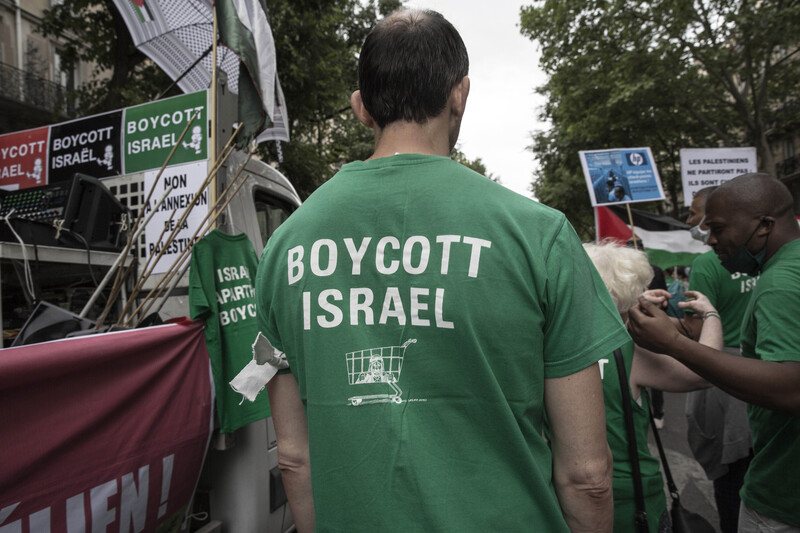The Electronic Intifada 12 May 2021

The global boycott is growing despite attempts to criminalize it.
ActiveStillsIsrael’s efforts to demonize the Palestinian call for boycott, divestment and sanctions (BDS) threaten a venerable form of nonviolent resistance.
These efforts push for the censoring of Palestinian voices and those of our allies, undermining free speech rights and academic freedom while falsely conflating criticism of the State of Israel with anti-Jewish bigotry.
At first, Israeli leadership acted as if the movement wasn’t a threat to its occupation, the policies and practices of which violate international law.
But a decade after the launch of the BDS call in 2005, as the movement gained strength internationally, the Israeli government declared war against it.
Thirty US states have now enacted some form of anti-BDS legislation. Governments, universities and other organizations around the world have also moved to suppress the movement.
In 2018, a public school employee in the US state of Texas was fired for refusing to sign an anti-BDS oath embedded in her employment contract.
She was told that she could no longer work in the state’s public schools after she refused to pledge that she “does not” and “will not” engage in a boycott of Israel or “otherwise take any action that is intended to inflict economic harm [on Israel].”
In April of 2019, a federal court ruled that the Texas law was unconstitutional.
In February this year, an appeals court determined that a similar law in the state of Arkansas violates the First Amendment. The decision was the fourth made by a federal court blocking an anti-BDS law on free speech grounds.
Pushback
Israel’s advocates are pushing a controversial “working definition” of anti-Semitism that conflates criticism of Israel with anti-Jewish bigotry.
That definition, published by the International Holocaust Remembrance Alliance, states that “anti-Semitism is a certain perception of Jews, which may be expressed as hatred toward Jews.”
That straightforward definition is complicated by a series of “contemporary examples” of anti-Semitism that extend to discussion of Israel.
The IHRA definition has already been used to suppress Palestine solidarity in Europe and North America.
But like the attempts to muzzle BDS, this means of shielding Israel from criticism hasn’t gone unchallenged.
The Massachusetts House of Representatives recently rejected an amendment to the state budget which would have embraced the IHRA definition of anti-Semitism.
Earlier this year, the Progressive Israel Network – comprised of 10 organizations including J Street, New Israel Fund and Americans for Peace Now – urged against the codification of the IHRA definition into US law and policy or its adoption by universities and corporations.
Despite attempts to undermine it, the grassroots Palestinian-led BDS movement is growing.
Through academic and cultural boycotts, an increasing number of scholars and artists are rejecting invitations to participate in Israeli-sponsored events.
Others are strengthening the economic boycott through their example.
Late last month, Charlie Pillsbury and four other descendants of the founder of the namesake food brand – endorsed a boycott of the company so long as it operates a factory in an illegal West Bank settlement.
Call to action
Palestinian Christians – laypeople and clergy representing the historic churches of Palestine – joined the boycott call in “A Moment of Truth,” a profoundly theological document, a confession of faith and a call to action.
In the document, Palestinian Christians reject anti-Semitism and assure our Jewish neighbors that “we are able to love and live together … after ending the occupation and establishing justice.”
In the meantime, we declare that “our option as Christians in the face of the Israeli occupation is to resist. It is a right and a duty for the Christian.”
We add that “it is resistance with love as its logic … for it must find human ways that engage the humanity of the enemy.”
As Palestinians seeking to end Israel’s brutal 54-year occupation, we ask those who would vilify boycott: If not this means to resist injustice, what is left to us?
Rifat Kassis is General Coordinator for Kairos Palestine and Global Kairos for Justice.




Comments
BDS's peaceful rsistance
Permalink Carol Scheller replied on
The BDS movement unites thinking, caring individuals from all walks of life. More and more organizations, businesses and churches are adhering to the movement. They share a commitment to the end of the occupation and abhor violence as a means to any end. Justice for them must be achieved by legal redress. Their weapon? : Pressure in the form of financial constraints and carefully documented factual informing. What better to come up with in the face of the horrors of the present moment ?
Boycotting Occupied Palestine (Israel)
Permalink Stefano R. Baldari replied on
"There is one thing stronger than all the armies in the world, and that is an idea whose time has come", Victor Hugo. The time to boycott Occupied Palestine (Israel) is an ideas whose time has come--now, more than ever before!
Many Jews support BDS
Permalink David replied on
One of the tools that opponents of BDS use is to smear its proponents as antisemitic.
I am Jewish and I support BDS. According to a recent Pew Research survey, so do 10% of my fellow young American Jews. Opposing apartheid is not only free speech, it is also a Jewish value, and it is not antisemitism.